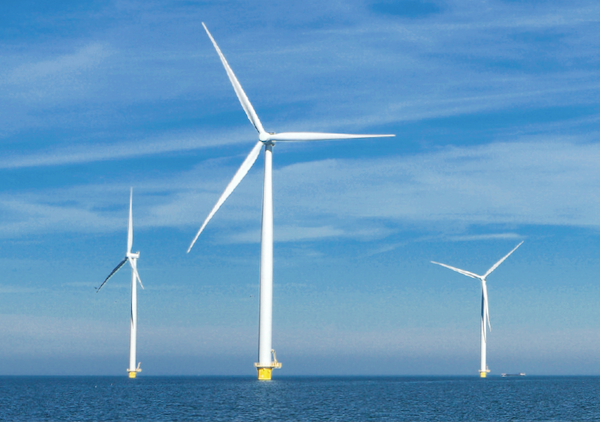
Offshore wind is coming to California. In 2021, AB 525 set a significant goal for the state to install 25 GW of offshore wind capacity over the next twenty years, and many bills and budget proposals have emerged as the state pursues this goal.
While environmentalists have generally supported offshore wind as a necessary tool to transition our economy off fossil fuels, Surfrider and other ocean organizations also maintain that the state must take a thoughtful approach to expediting a brand new industry in our oceans.
Thousands of floating turbines are expected to be placed in the California Current, the oceanographic feature that drives our coast’s extraordinary productivity and ecological vitality. These machines — each taller than the towers of the Golden Gate Bridge and moored to the seabed with multiple steel cables running hundreds of meters through the water column — represent entirely novel technology for California’s coast and ocean.
Such technology has never been deployed at the scale now envisioned for waters off our shores. Effects on oceanographic currents, migrating marine mammals, turtles and birds, and other marine life remain unknown.
If offshore oil development taught us anything, it's that big ocean industries can have dramatic impacts on the public health and coastal access afforded to coastal communities, as well as on healthy fisheries and their habitats.
Therefore we support offshore wind development — but we believe coastal access, environmental justice and natural resource implications must be thoughtfully considered upfront.
In 2023 we are supporting one California bill and one budget augmentation request that call on the State Legislature and Governor of California to appropriately consider natural resources and coastal communities in the process of legislating offshore wind development.
SB 286 (McGuire) will streamline offshore wind permitting while establishing the State Lands Commission as the lead agency to manage the California Environmental Quality Act (CEQA) for offshore wind energy projects.
Surfrider is supporting this bill because we believe the State Lands Commission is the appropriate agency to oversee the CEQA process. CEQA provides primary legal and planning considerations for how an offshore wind project impacts environmental resources. The State Lands Commission is the steward and manager of the state's public trust offshore and along the coast, and is best positioned to consider how stewardship can be managed and regulated with the public trust in mind.
We are also calling on the Legislature and Governor Newsom to make a budget augmentation for offshore wind staffing at the California Coastal Commission to address its lack of specialized personnel and to support thorough and timely review of forthcoming offshore wind development proposals.
The California Coastal Commission is already working with the State Lands Commission and the federal government to manage the comprehensive, science-driven review and analysis of potential impacts from coastal and offshore development for both natural and cultural resources, and for Tribal and environmental justice communities.
Current staffing levels at the Coastal Commission are grossly inadequate to manage the process of accelerating offshore wind development - with literally one planner dedicated to offshore wind proposals, and only one geologist and one engineer for its entire case load.There is simply no way the Coastal Commission can be expected to fulfill their legally required duties to thoroughly review the first-of-their-kind site assessments and construction and operations plans for offshore wind facilities of the proposed scale and complexity with only one dedicated planner.
Surfrider is in strong support of SB 286 as well as increased budget and capacity for the Coastal Commission to manage offshore wind.
